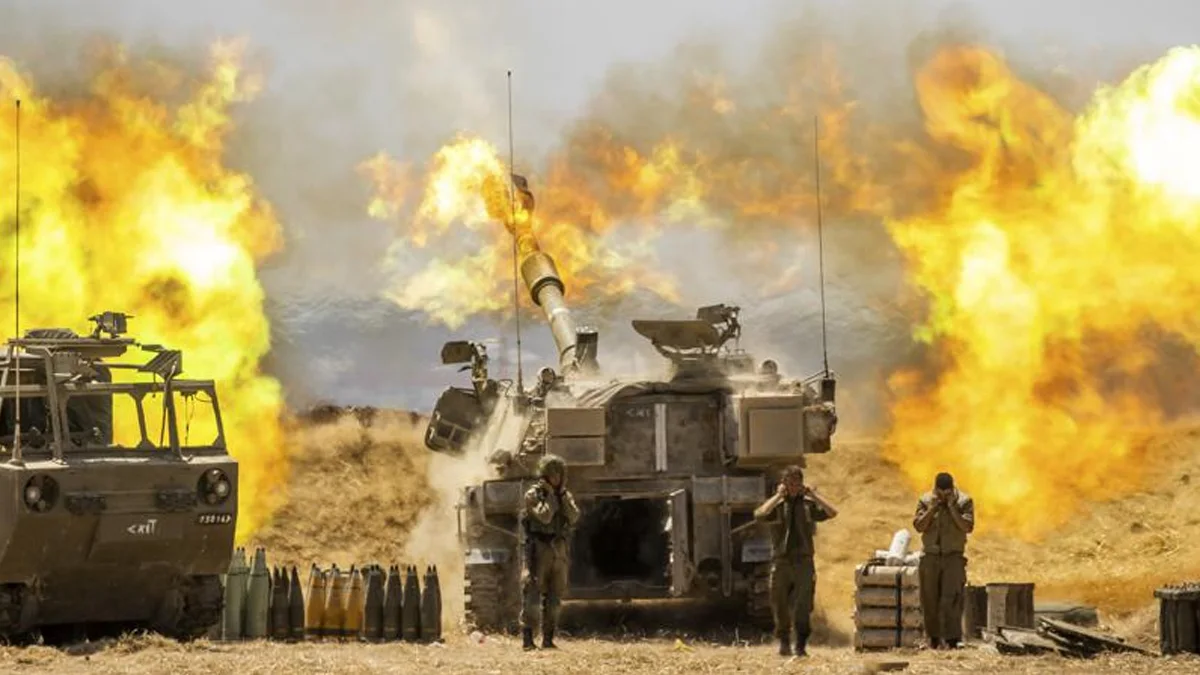As oil traders get ready for the market to open after the sudden outbreak of conflict in Israel, there’s a big question on everyone’s mind: Could this conflict spread to other parts of the region?
Crude oil traders aren’t anticipating a significant spike in prices right away because there’s no immediate threat to the oil supply. However, all attention is focused on Iran, which is a major oil producer and a key supporter of the Hamas group that initiated the recent offensive against Israel.
If there were to be a retaliatory attack against Iran, it could raise concerns about the Strait of Hormuz, a crucial route for shipping, which Iran has threatened to close in the past. There’s also the possibility that the United States might take action to restrict the flow of Iranian oil exports once again.
Helima Croft, who is the chief commodities strategist at RBC Capital Markets and a former CIA analyst, pointed out, “Iran is a major unpredictable factor in this situation. Israel is likely to intensify its ongoing covert conflict with Iran, and what we can’t predict is how Iran might respond to such an escalation.”
The risk of a conflict in the Middle East has arisen at a time when global crude oil supplies have been reduced due to significant production cuts by Saudi Arabia and Russia over the past few months. Just last month, these restrictions briefly pushed Brent oil futures to nearly $100 per barrel.
Hedge fund trader Pierre Andurand, who is the founder of Andurand Capital Management LLP, believes, “In the short term, it’s unlikely to affect oil supply, but it could eventually influence both supply and prices.”
This situation is reminiscent of the events that occurred nearly 50 years ago during the Arab oil embargo. At that time, Saudi Arabia and other OPEC producers halted oil exports to the western world in response to the 1973 Yom Kippur War, which also involved Israel.
Nobody expects Riyadh, which has been in talks with Washington about improving relations with Israel, to stop oil production to show support for the Palestinians at this time. The worst-case scenario might be that the conflict disrupts the normalization discussions and prevents any potential increase in Saudi oil exports.
The Energy Minister of the United Arab Emirates, an important member of OPEC, made it clear on Sunday that the conflict won’t impact the group’s decision-making. He said, “We don’t get involved in politics; we base our decisions on supply and demand, and we don’t consider the actions of individual countries.”
On the other hand, Iran, also a member of OPEC, has expressed its support for the Palestinian attack.
If Israel were to retaliate by attacking any Iranian infrastructure, it could cause a sudden increase in crude oil prices due to the perceived risk of a disruption. Bob McNally, who is the president of Rapidan Energy Group and a former White House official, mentioned this possibility. However, at the moment, it doesn’t seem likely.
Iranian oil has become increasingly important in the global market as shipments have reached a five-year high. This increase has happened with the tacit approval of Washington, as both sides have engaged in tentative diplomacy to set new limits on Iran’s nuclear program.
The recent hostilities over the weekend might prompt President Joe Biden’s administration to take a more aggressive stance toward these oil shipments, especially those that primarily go to China.
“I believe this development will lead to stricter enforcement of sanctions against Iran, resulting in reduced Iranian oil exports in the future,” said Andurand. “And then, it’s uncertain what ripple effects might occur in the region.”
In a more extreme scenario, if there is a direct provocation, Iran could respond by blocking the Strait of Hormuz, which is a narrow passage just north of the Arabian Sea. Every day, tankers transport nearly 17 million barrels of crude oil and condensate through this waterway, which is only 21 miles wide at its narrowest point. In the past, when sanctions were imposed on Iran in 2011, Tehran threatened to close the strait, but it eventually backed down.
The increased flow of Iranian oil has helped stabilize fuel prices this year, particularly as Saudi Arabia and Russia, under the leadership of Vladimir Putin, have reduced their oil supplies. This joint effort by Riyadh and Moscow has rapidly depleted global oil inventories and increased the price of immediate oil supplies, known in the industry as backwardation.
According to Gary Ross, a seasoned oil consultant who now manages a hedge fund at Black Gold Investors LLC, the oil market is currently very tight. He mentions that the physical markets are showing signs of strain, with backwardation increasing and driving up the flat price of oil.
However, there were indications last week that the push for oil prices to reach $100 per barrel may have been excessive. Brent crude, a major oil benchmark, saw an 11% drop to just below $85 per barrel on the ICE Futures Europe exchange. The production cuts made by Saudi Arabia and Russia might have pushed prices too high, causing concerns about the economy and the possibility of higher interest rates.
On the other hand, by reducing their oil output to approximately 9 million barrels per day, Saudi Arabia has built up a significant reserve of spare production capacity. This reserve could be used if the current crisis results in a disruption of the oil supply. Saudi Arabia is estimated to have around 3 million barrels per day in reserve, and the neighboring United Arab Emirates has an additional 1 million barrels.
One of the reasons why traders don’t anticipate an immediate spike in oil prices when the markets reopen is the substantial reserve of unused production capacity. However, these recent events could bring back some of the geopolitical risk factor that had diminished in recent times.
Richard Bronze, who heads the geopolitics division at Energy Aspects Ltd., remarked, “The attack by Hamas and Israel’s response is increasing geopolitical tensions.”





